The endoplasmic reticulum stress response factor CHOP-10 protects against hypoxia-induced neuronal death
- PMID: 20448044
- PMCID: PMC2898390
- DOI: 10.1074/jbc.M109.095299
The endoplasmic reticulum stress response factor CHOP-10 protects against hypoxia-induced neuronal death
Abstract
Hypoxia-induced gene expression is a critical determinant of neuron survival after stroke. Understanding the cell autonomous genetic program controlling adaptive and pathological transcription could have important therapeutic implications. To identify the factors that modulate delayed neuronal apoptosis after hypoxic injury, we developed an in vitro culture model that recapitulates these divergent responses and characterized the sequence of gene expression changes using microarrays. Hypoxia induced a disproportionate number of bZIP transcription factors and related targets involved in the endoplasmic reticulum stress response. Although the temporal and spatial aspects of ATF4 expression correlated with neuron loss, our results did not support the anticipated pathological role for delayed CHOP expression. Rather, CHOP deletion enhanced neuronal susceptibility to both hypoxic and thapsigargin-mediated injury and attenuated brain-derived neurotrophic factor-induced neuroprotection. Also, enforced expression of CHOP prior to the onset of hypoxia protected wild-type cultures against subsequent injury. Collectively, these findings indicate CHOP serves a more complex role in the neuronal response to hypoxic stress with involvement in both ischemic preconditioning and delayed neuroprotection.
Figures
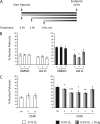
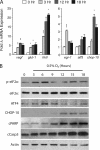
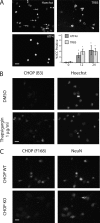
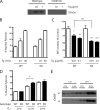
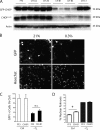


Similar articles
-
Neuronal apoptosis induced by endoplasmic reticulum stress is regulated by ATF4-CHOP-mediated induction of the Bcl-2 homology 3-only member PUMA.J Neurosci. 2010 Dec 15;30(50):16938-48. doi: 10.1523/JNEUROSCI.1598-10.2010. J Neurosci. 2010. PMID: 21159964 Free PMC article.
-
Ethanol promotes endoplasmic reticulum stress-induced neuronal death: involvement of oxidative stress.J Neurosci Res. 2008 Mar;86(4):937-46. doi: 10.1002/jnr.21540. J Neurosci Res. 2008. PMID: 17941056 Free PMC article.
-
Loss of c/EBP-beta activity promotes the adaptive to apoptotic switch in hypoxic cortical neurons.Mol Cell Neurosci. 2008 Jun;38(2):125-37. doi: 10.1016/j.mcn.2008.01.014. Epub 2008 Feb 13. Mol Cell Neurosci. 2008. PMID: 18439838 Free PMC article.
-
The Role of the PERK/eIF2α/ATF4/CHOP Signaling Pathway in Tumor Progression During Endoplasmic Reticulum Stress.Curr Mol Med. 2016;16(6):533-44. doi: 10.2174/1566524016666160523143937. Curr Mol Med. 2016. PMID: 27211800 Free PMC article. Review.
-
CHOP and the endoplasmic reticulum stress response in myelinating glia.Curr Opin Neurobiol. 2009 Oct;19(5):505-10. doi: 10.1016/j.conb.2009.08.007. Epub 2009 Sep 8. Curr Opin Neurobiol. 2009. PMID: 19744850 Free PMC article. Review.
Cited by
-
Hypothermic Preconditioning of Human Cortical Neurons Requires Proteostatic Priming.EBioMedicine. 2015 Apr 11;2(6):528-35. doi: 10.1016/j.ebiom.2015.04.004. eCollection 2015 Jun. EBioMedicine. 2015. PMID: 26287272 Free PMC article.
-
ATF4 protects against neuronal death in cellular Parkinson's disease models by maintaining levels of parkin.J Neurosci. 2013 Feb 6;33(6):2398-407. doi: 10.1523/JNEUROSCI.2292-12.2013. J Neurosci. 2013. PMID: 23392669 Free PMC article.
-
Compensatory increases of select proteostasis networks after Hsp70 inhibition in cancer cells.J Cell Sci. 2018 Sep 5;131(17):jcs217760. doi: 10.1242/jcs.217760. J Cell Sci. 2018. PMID: 30131440 Free PMC article.
-
De-repression of myelin-regulating gene expression after status epilepticus in mice lacking the C/EBP homologous protein CHOP.Int J Physiol Pathophysiol Pharmacol. 2014 Dec 15;6(4):185-98. eCollection 2014. Int J Physiol Pathophysiol Pharmacol. 2014. PMID: 25755840 Free PMC article.
-
Status epilepticus triggers early and late alterations in brain-derived neurotrophic factor and NMDA glutamate receptor Grin2b DNA methylation levels in the hippocampus.Neuroscience. 2013 Sep 17;248:602-19. doi: 10.1016/j.neuroscience.2013.06.029. Epub 2013 Jun 27. Neuroscience. 2013. PMID: 23811393 Free PMC article.
References
-
- Kirino T., Tamura A., Sano K. (1984) Acta Neuropathol. 64, 139–147 - PubMed
-
- Du C., Hu R., Csernansky C. A., Hsu C. Y., Choi D. W. (1996) J. Cereb. Blood Flow Metab. 16, 195–201 - PubMed
-
- Konaka K., Miyashita K., Naritomi H. (2007) J. Stroke Cerebrovasc. Dis. 16, 82–83 - PubMed
-
- Shigeno T., Yamasaki Y., Kato G., Kusaka K., Mima T., Takakura K., Graham D. I., Furukawa S. (1990) Neurosci. Lett. 120, 117–119 - PubMed
MeSH terms
Substances
Grants and funding
LinkOut - more resources
Full Text Sources
Research Materials

